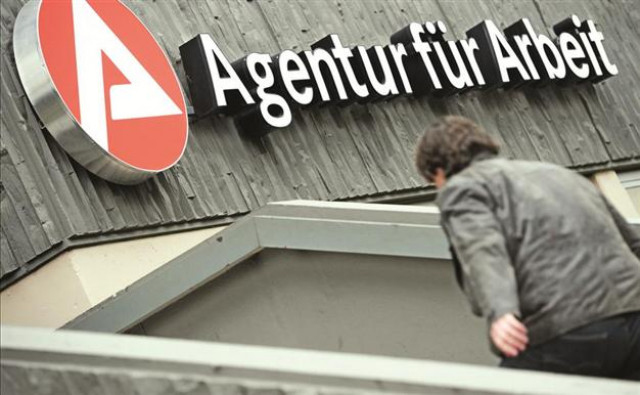German unemployment at post-reunification low
The unemployment rate declined to 6.3 percent in November from 6.4 percent in October

PHOTO: AFP
The jobless rate is now at the lowest level since West and East Germany reunited in 1990 after the fall of the Berlin Wall the previous year, the Federal Labour Office said in a statement.
Even the on-going scandal at Volkswagen has not made a dent in the labour market's recovery, analysts said.
The unemployment rate -- which measures the jobless total against the working population as a whole -- declined to 6.3 percent in November from 6.4 percent in October.
Under pressure as never before, Merkel marks 10 years in office
In numerical terms, the number of people registered as unemployed in Germany declined by a seasonally-adjusted 13,000 to 2.772 million, the Federal Labour Office said.
That was more than expected, as analysts had been pencilling in a decline of around 5,000.
In raw, or unadjusted, terms, the jobless total decreased by 16,000 to 2.633 million and the unemployment rate was unchanged at 6.0 percent, the office noted.
The German economy grew by 0.3 percent in the third quarter, continuing on from the "solid trend" seen in the first six months of this year, the office said.
German anti-Islam protest swells on fears about refugee influx
Consumer demand and government spending were the main driving forces behind growth.
"The labour market remains in good shape and is continuing to develop favourably," the labour office said.
Economists welcomed the new decline in unemployment.
"Fears that the Volkswagen scandal could have negative consequences for the labour market have again proved groundless," said BayernLB economist Stefan Kipar.
German parliament okays law to store telephone and Internet data
The auto giant, one of the biggest employers in the north German state of Lower Saxony, is embroiled in a global pollution-cheating scandal that some observers suggest could hurt the German economy as a whole.
"The German labour is looking very robust," said Postbank economist Heinrich Bayer.
Neither was there any evidence just yet that the huge influx of refugees into Germany was pushing up the jobless rate, analysts said.
But that could change in the coming months as migrants looking for work initially sign on the dole, they cautioned.
"Those migrants arriving here must first find a job fitting their qualifications," said BayernLB's Kipar.
"Overall, labour market conditions remain healthier in Germany than in most other countries in Europe," said IHS Global Insight analyst Timo Klein.



















COMMENTS
Comments are moderated and generally will be posted if they are on-topic and not abusive.
For more information, please see our Comments FAQ